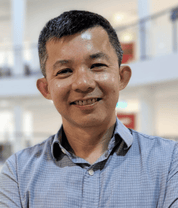
Professor Tri Phan
Professor Tri Phan studied undergraduate medicine at the University of Sydney and completed a double fellowship in Internal Medicine and Pathology under the guidance Dr Stephen Adelstein and Dr Roger Garsia in the Department of Clinical Immunology at the Royal Prince Alfred Hospital, Sydney. For his PhD he developed a B cell receptor knock-in mouse model to study in vivo B cell responses to foreign and self-antigen under the supervision of Professor Antony Basten and Associate Professor Robert Brink at the Centenary Institute, Sydney.
His interest in defining the in vivo contexts of B cell responses and resolving germinal centre selection events in space and time lead to post-doctoral studies with Professor Jason Cyster at the Howard Hughes Medical Institute, University of California, San Francisco where he used intravital two-photon microscopy to investigate the initiation of B cell responses in the lymph node. Tri established an intravital two-photon microscope facility at the Garvan Institute in 2010.
Awards
- 2018NHMRC Senior Research Fellowship
- 2017SVH Consultant Tutor of the Year
- 2014ANSTO Eureka Prize for Innovative Use of Technology
- 2011NHMRC Career Development Fellowship
- 2006American Australian Association Sir Keith Murdoch Fellowship
- 2006NHMRC C.J. Martin Post-doctoral Research Fellowship
- 2005Australasian Society of Immunology New Investigator Award
- 2005University of Sydney Early Career Development Award
- 1999D.S. Nelson Prize (Royal College of Pathologists of Australasia)
- 1998Eddie Hirst Memorial Prize (Royal College of Pathologists of Australasia)
- 1994University Medal - University of Sydney
Selected publications
See all publications- 2023Science Advances10.1126/sciadv.adf9063
Monitoring AKT activity and targeting in live tissue and disease contexts using a real-time Akt-FRET biosensor mouse.
- 2017Science Translational Medicine10.1126/scitranslmed.aai8504
Transient tissue priming via ROCK inhibition uncouples pancreatic cancer progression, sensitivity to chemotherapy, and metastasis.
